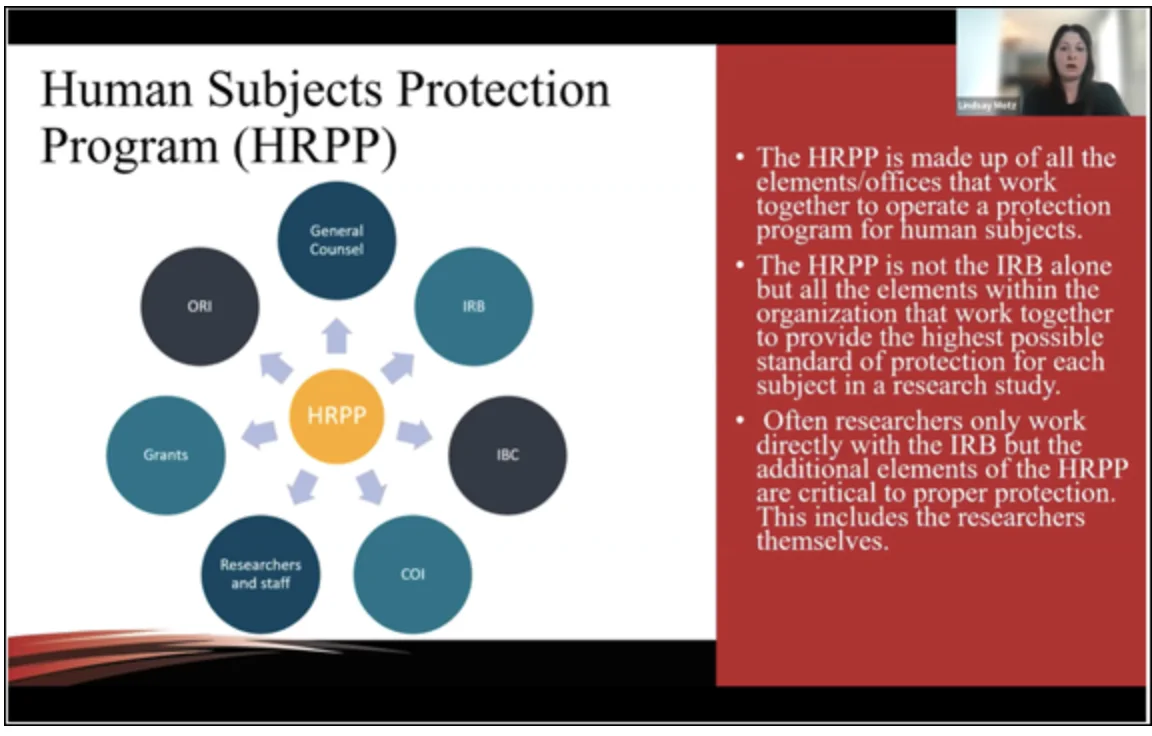ORISE STEM Workforce Development and Health Studies programs collaborate on Institutional Review Board webinar

Every year, the ORISE STEM Workforce Development program hosts approximately 9,000 participants, many of whom engage in what is known as human subjects research (i.e., the systematic and scientific investigation involving living individuals as research subjects). It is federal law that the ORISE research participants and their mentors on the project submit their proposals to an institutional review board (IRB) if their project involves either biomedical or social-behavioral-educational research of human subjects.
“If you’ve never interacted with an IRB, the process can seem daunting and many researchers worry about their ability to successfully complete an IRB review,” said ORISE STEM Workforce Development Project Manager Chelsea Gibson. “Fortunately, we have a resource within the ORISE contract to help better prepare our participants for this part of their research journey.”
The resource Gibson is referring to is the ORISE Health Studies program, which is responsible for providing technical assistance to both the Oak Ridge Site Wide IRB and the Central DOE IRB. The two groups partnered to create the Not-So-Formal IRB Survival Guide webinar that was hosted on March 16, 2023 by ORISE Epidemiologist Sara Howard and ORISE Administrator for the DOE Central and Oak Ridge Site IRBs Lindsay Motz.
“We wanted this event to provide insight and perspectives from both sides of the IRB process,” said Gibson. “Lindsay gave a historical perspective of human subjects research and the importance of the IRB while Sara provided her perspective of the IRB process as an early career researcher.”
Examples of the survey respondents positive feedback included:ORISE Community of Engagement Series: The Not-So-Formal IRB Survival Guide
a researcher who uses them."
Motz began the webinar with the basics: general IRB concepts, the approval process, and resources.
“From a historical perspective, there are a number of atrocious studies that were conducted on human subjects, both nationally and internationally, that have ultimately helped to frame the ethical regulations and strict codes of conduct we see today,” said Motz.
Howard, who referenced her own research career, provided her perspective by sharing general tips and tricks for navigating the IRB process.
“I wanted to emphasize the importance for researchers to put themselves in the shoes of the humans being researched and to always keep their protection in the forefront of the study,” said Howard.
Afterwards, participants had the opportunity to ask questions. Out of 103 registrants, 58 attended the webinar (a 56.3 percent participation rate). Sixteen of those attendees also completed a post-event survey which resulted in an overall 81.3 percent “very satisfactory” or “satisfactory” response. Those who completed the survey also indicated that the webinar topic was “relevant” or “very relevant” to their professional or personal lives.
A video recording of the event can be found at The Not-So-Formal IRB Survival Guide (vimeo.com).
Media Contacts
Pam Bonee
Director, Communications
Phone: 865.603.5142
pam.bonee@orau.org
Wendy West
Manager, Communications
Phone: 865.207.7953
wendy.west@orau.org
The Oak Ridge Institute for Science and Education (ORISE) is a U.S. Department of Energy (DOE) asset that is dedicated to enabling critical scientific, research, and health initiatives of the department and its laboratory system by providing world class expertise in STEM workforce development, scientific and technical reviews, and the evaluation of radiation exposure and environmental contamination.
ORISE is managed by ORAU, a 501(c)(3) nonprofit corporation and federal contractor, for DOE’s Office of Science. The single largest supporter of basic research in the physical sciences in the United States, the Office of Science is working to address some of the most pressing challenges of our time. For more information, please visit science.osti.gov.

